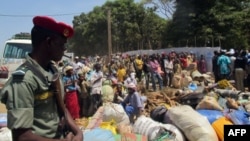Central African Republic refugees in eastern Cameroon are insisting on leaving refugee camps due to difficult living conditions, saying they are being poorly fed, and their children lack school and humanitarian assistance.
But the government of Cameroon has been arresting refugees who leave the camps.
Nadiko Angel, 36, who fled the refugee camp in Giwa, eastern Cameroon, said she was in Garoua-Boulaye looking for a job to raise money and assist her husband, who has been sick since they fled the Central Africa Republic's (CAR) capital, Bangui, and arrived in Cameroon one year ago.
She said her husband was suffering in the refugee camp and they did not have enough to eat.
Forced back to camp
Moukoulou Lionnel, 22, who also fled from CAR's town of Bria, said he was arrested by Cameroon police and forced back to the Giwa refugee camp. He said he would never live in the camp because they did not have enough food, water and medical care.
He said he was asked to clear a farm, but after doing the job, the owner of the farm refused to pay. He said he has decided to open a garden in an unoccupied land with the hope of selling vegetables in two months.
Cameroon estimates there are at least 200,000 CAR refugees in the central African nation.
Jean Angelbert Malaka, the most senior government official in Garoua Boulaye, said there were so many refugees escaping to towns and villages, the government has been insisting the refugees return to the camps.
Malaka said there were strict and systematic controls organized by the police and military, especially at night, because of rising insecurity.
Augustine Doli Deba of the Yaounde-based, nongovernmental organization Refugee Rights, said the standoff between the refugees and the government of Cameroon would likely continue until peace returned to CAR and the refugees went back home.
Refugees
Deba said everyone knew there was no peace in the Central African Republic and the refugees were not ready to go back.
He said the governments of Cameroon and CAR should agree on how to manage the refugees because with the difficult conditions in the camps, they would never stop insisting on leaving the camps to integrate themselves with Cameroonians.
Conflict began in CAR in 2013 after the Muslim Seleka rebels toppled Francois Bozize's government leading to reprisals from Christians who formed anti-Balaka militias.
Last year, the government of Cameroon announced that it was not able to cope with the increasing needs of the refugees and pleaded with the international community to help.




